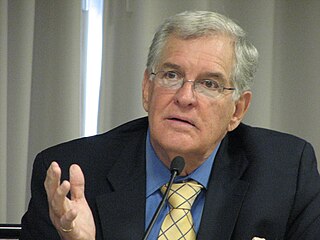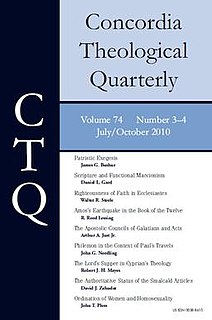Charles A. Gieschen | |
|---|---|
| Nationality | American |
| Title | Professor of Exegetical Theology and Dean of Academics at Concordia Theological Seminary |
| Board member of | Associate Editor of the journal Concordia Theological Quarterly American Editorial Board of Henoch |
| Academic background | |
| Education | Princeton Theological Seminary, Concordia Theological Seminary |
| Alma mater | University of Michigan (Ph.D.) |
| Thesis | Angelomorphic Christology: Antecedents and Early Evidence (1995) |
| Influences | Jarl Fossum, Gabriele Boccaccini |
| Academic work | |
| Discipline | Biblical studies |
| Institutions | Concordia Theological Seminary |
| Notable works | The Law in Holy Scripture |
Charles A. Gieschen is Christian theologian who currently serves as Professor of Exegetical Theology and Dean of Academics at Concordia Theological Seminary in Fort Wayne, Indiana. His Ph.D. is from the Department of Near Eastern Studies at the University of Michigan where he studied the literature of Second Temple Judaism and Early Christianity under Jarl Fossum and Gabriele Boccaccini, and alongside April DeConick. [1] Gieschen's dissertation, entitled Angelomorphic Christology: Antecedents and Early Evidence, was published by Brill Academic Publishers in 1998.

The Concordia Theological Seminary is a Lutheran seminary in Fort Wayne, Indiana. It offers professional, master's degrees, and doctoral degrees affiliated with training clergy and deaconesses for the Lutheran Church–Missouri Synod.

Fort Wayne is a city in the U.S. state of Indiana and the seat of Allen County, United States. Located in northeastern Indiana, the city is 18 miles (29 km) west of the Ohio border and 50 miles (80 km) south of the Michigan border. With a population of 253,691 in the 2010 census, it is the second-most populous city in Indiana after Indianapolis, and the 75th-most populous city in the United States. It is the principal city of the Fort Wayne metropolitan area, consisting of Allen, Wells, and Whitley counties, a combined population of 419,453 as of 2011. Fort Wayne is the cultural and economic center of northeastern Indiana. The city is within a 300-mile radius of major population centers, including Chicago, Cincinnati, Cleveland, Columbus, Detroit, Indianapolis, Louisville, Lexington, and Milwaukee. In addition to the three core counties, the combined statistical area (CSA) includes Adams, DeKalb, Huntington, Noble, and Steuben counties, with an estimated population of 615,077.

The University of Michigan, often simply referred to as Michigan, is a public research university in Ann Arbor, Michigan. The university is Michigan's oldest; it was founded in 1817 in Detroit, as the Catholepistemiad, or University of Michigania, 20 years before the territory became a state. The school was moved to Ann Arbor in 1837 onto 40 acres (16 ha) of what is now known as Central Campus. Since its establishment in Ann Arbor, the university campus has expanded to include more than 584 major buildings with a combined area of more than 34 million gross square feet spread out over a Central Campus and North Campus, two regional campuses in Flint and Dearborn, and a Center in Detroit. The university is a founding member of the Association of American Universities.
Contents
He also holds a Master of Theology degree in New Testament from Princeton Theological Seminary, where he studied under James H. Charlesworth and Martinus de Boer, [1] and a Master of Divinity degree from Concordia Theological Seminary. He is a member of the Society of Biblical Literature and the International Enoch seminar. He is the Associate Editor of the journal Concordia Theological Quarterly [2] and on the American Editorial Board of Henoch , a journal dealing with the literature of Second Temple Judaism and Early Christianity. [3]

Princeton Theological Seminary (PTS) is a private Presbyterian school of theology in Princeton, New Jersey. Founded in 1812 under the auspices of Archibald Alexander, the General Assembly of the Presbyterian Church, and the College of New Jersey, it is the second-oldest seminary in the United States. It is also the largest of ten seminaries associated with the Presbyterian Church.

James Hamilton Charlesworth was the George L. Collord Professor of New Testament Language and Literature until January 17, 2019 and Director of the Dead Sea Scrolls Project at the Princeton Theological Seminary. His research interests include the Apocrypha and Pseudepigrapha of the Hebrew and Christian Bibles, the Dead Sea Scrolls, Josephus, the Historical Jesus, the Gospel of John, and the Revelation of John.
The Society of Biblical Literature (SBL), founded in 1880 as the Society of Biblical Literature and Exegesis, is an American-based learned society dedicated to the academic study of the Bible and related ancient literature. Its current stated mission is to "foster biblical scholarship". Membership is open to the public, and consists of over 8,500 individuals from over 80 countries. As a scholarly organization, SBL has been a constituent society of the American Council of Learned Societies since 1929.
Gieschen teaches courses primarily in New Testament and is a specialist in early Christology. He is also an ordained minister in the Lutheran Church–Missouri Synod, and served at Trinity Lutheran Church in Traverse City, Michigan from 1985–1996, [4] during which time he obtained his Ph.D.

Christology, literally "the understanding of Christ," is the study of the nature (person) and work of Jesus Christ. It studies Jesus Christ's humanity and divinity, and the relation between these two natures; and the role he plays in salvation.

The Lutheran Church—Missouri Synod (LCMS), often referred to simply as the Missouri Synod, is a traditional, confessional Lutheran denomination in the United States. With slightly under 2.0 million members, it is the second-largest Lutheran body in the United States. The LCMS was organized in 1847 at a meeting in Chicago, Illinois, as the German Evangelical Lutheran Synod of Missouri, Ohio, and Other States, a name which reflected the geographic locations of the founding congregations.

Traverse City is a city in the U.S. state of Michigan. It is the county seat of Grand Traverse County, although a small portion extends into Leelanau County. It is the largest city in the 21-county Northern Michigan region. The population was 14,674 at the 2010 census, with 143,372 in the Traverse City micropolitan area.









